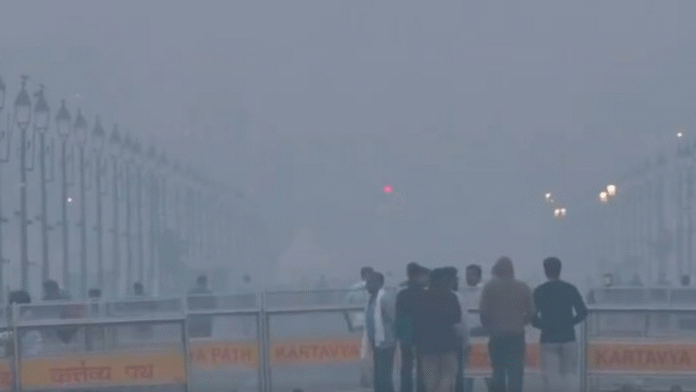Delhi continues to choke three days after Diwali, with air quality plunging into the ‘severe’ and ‘very poor’ categories in various parts of the national capital amid Graded Response Action Plan (GRAP-2) being in effect.
The Central Pollution Control Board (CPCB) recorded AQI 428 around Anand Vihar this morning, while it was 350 near Akshardham. The AQI near All India Institute Of Medical Sciences (AIIMS) and nearby areas was recorded at 342, according to the CPCB.
“Actions under Stage-I & II of the extant GRAP shall be implemented, monitored and reviewed in right earnest by all the agencies concerned in the entire NCR to ensure that the AQI levels do not slip further. All implementing agencies shall keep strict vigil and intensify measures to the extent of the GRAP schedule. Citizens may be requested to strictly adhere to the citizen charter under GRAP Stage-I & II”, ANI quoted Commission for Air Quality Management’s (CAQM) order as saying.
Dr Nikhil Modi on rising AQI
On Tuesday, Dr. Nikhil Modi, a Respiratory Medicine Specialist at Apollo Hospitals, discussed the seasonal reasons behind the rise in pollution levels.
As per a report by ANI, he explained, “As winter approaches every year, we see the AQI start to rise because as the air cools, the wind speed decreases, and cold air does not rise, causing pollution to accumulate at lower levels.” He added that the increase in AQI was noticeable even before Diwali and was expected to continue rising after the festival. Dr. Modi noted, “As soon as pollution increases, people with allergies and lung problems face issues like difficulty in breathing, coughing, watery eyes, and other symptoms.”
AAP, BJP exchange war of words over pollution in
Meanwhile, Delhi Chief Minister Rekha Gupta stated that air pollution data before and after Diwali showed improvement compared to last year, according to PTI. During a press conference, she said, “The pre- and post-Diwali gap (between average AQI) this year is less compared to the previous year, even though firecrackers were allowed this time.”
AAP leaders accused the BJP government in Delhi of closing pollution monitoring stations across the city, while Environment Minister Manjinder Singh Sirsa pointed to stubble burning in Punjab as the cause of worsening air quality.
Data from the Punjab Pollution Control Board mentioned that the state recorded 415 farm fire incidents between September 15 and October 21 this year, a decrease from 1,510 incidents during the same period last year. This significant decline is attributed to a delayed paddy harvest due to rains that continued until the first week of October, the report noted, adding damage caused by flood in Punjab also contributed to the delay in crop harvesting in some areas.
farm fire incidents, air quality, Diwali, Punjab Pollution Control Board, stubble burning, Diwali air pollution, Graded Response Action Plan, Delhi air quality, Central Pollution Control Board, AQI levels, stubble burning in Punjab, stubble burning incidents, Delhi aqi, Delhi news, delhi air pollution, delhi pollution
#Delhi #continues #choke #days #Diwali #AQI #plunges #severe #category #GRAP #effect #Watch #videos

